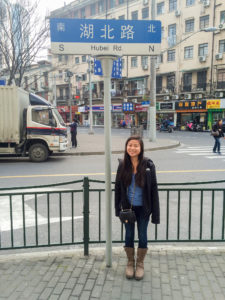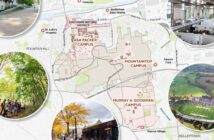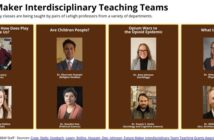
Lucy Swett, ’18, poses in front of a street sign in Shangai, China, where she studied abroad during the 2017 spring semester. The street sign reads “Hubei Rd.” and is named after the province in which Lucy was born. (Courtesy of Lucy Swett)
Lucy Swett dug her shovel into the fine Florida sand.
As waves slapped the shore of Ponte Vedra beach and her younger siblings combed the coast for shark teeth, the determined 10-year-old kept digging.
And digging.
If she dug a tunnel deep enough, she could reach China, she thought to herself. But how would she speak to them in another language? Who would she meet? What would China look like?
It was her first home, yet it was so foreign to her.
Swett, who was born in Hubei, China, and adopted one year later by her American parents, couldn’t dig deep enough to reach the country that had remained a mystery to her for years.
But a culmination of good timing, willpower and persistent curiosity finally landed Swett in China 19 years after her adoptive parents brought her to the place she has always called home – Jacksonville, Florida.
As the incessant thought of her birthplace eroded Swett’s patience throughout her childhood and followed her to college, she realized a visit to her homeland was imminent.
Swett, ’19, who today is a Lehigh computer science major, decided last fall she needed to seek answers. She paused her sophomore year and traveled nearly 8,000 miles to Jiao Tong University in Shanghai to complete her spring semester abroad.
But one semester wasn’t enough.
With only two weeks left of her spring term at Jiao Tong, Swett realized she was not prepared to leave China.
After spending a day crammed with barbecues and karaoke in the company of her Chinese language partner, Swett surprised herself. For the first time in her 20 years, Swett had formed unprompted thoughts in Chinese.
Having just started to feel comfortable speaking Chinese, she didn’t want to lose the ability altogether. But, more importantly, Swett was beginning to garner a sense of her Chinese identity that had evaded her in the past.
She decided she needed to stay — at least one month more, and hopefully longer. Swett rushed to apply to the Lehigh in Shanghai summer program. She was accepted and lived in Shanghai for another month, continuing her Chinese language training and interning at Dell EMC, where she designed websites.
She asked the company to extend her internship and remained in Shanghai for an additional three weeks after her Lehigh peers flew back to the United States.
“(My parents) kept telling me that I was so brave,” Swett said. “But it’s just something that I knew I had to do.”
During her five and a half months in Shanghai, Swett, who studied Chinese for seven years prior to her trip, took two Chinese courses to improve her language skills.
At Jiao Tong, native Chinese speakers would often approach Swett, but she found herself stumbling on words and apologizing for her American nationality.
“China (was) so foreign,” Swett said. “Even though I actually fit in pretty well, sometimes people would come up to me and I wouldn’t even know what to say.”
Swett’s summer session roommate and fellow Lehigh student Yoyo Wu, ’18, who moved to the U.S. from Beijing when she was 12, said Swett is unlike other American-born Chinese individuals she’s met.
Wu described Swett as Western in thought and behavior, but said she would never have guessed Swett was adopted if it hadn’t been for the dorm decorations — particularly the calendar photo album, covered with photos of relatives and friends from home.
Swett said Chinese students could tell she was American before she even opened her mouth. Her outfits and tan complexion — which defies the Chinese beauty standard of pale, porcelain skin — were immediate clues of her foreign upbringing.
Swett’s roommate at Jiao Tong, Christine Goins, said she could only recall a few times when Swett was mistaken for a Chinese citizen — they almost always knew she was an outsider.
Despite sounding, behaving and looking like an American, Swett was still confident when introducing herself to Chinese citizens. She eventually joined a church group, something she said tourists would not typically consider.
But Swett also found herself enjoying the typical tourist activities. Along with a few friends she met at the university, she traveled to Chengdu, where she saw the famous Research Base of Giant Panda Breeding and even embarked on three separate trips to Beijing to see the Great Wall.
On her final trip to Beijing, Swett reunited with her adoptive mother and two younger sisters, Clara and May May, who were also adopted from China. The trip marked the family’s first time together in the country.
Wu said the soft-spoken Swett is devoted to her family, and that she often spent her free time creating blog posts and videos to later share with loved ones. Swett said she was most comfortable expressing her thoughts in these posts, which often focused on her identity.
The more time Swett spent in China, the more she thought about where she belongs in this world.
“I looked at the kids on the subway, and I was thinking, ‘I could have been one of those people,’” Swett said. “How different would I have been?”
Swett said after returning from China, she resonates more with her American identity. She added she could never call China “home.”
“I think home is wherever my family is,” she said.
While Swett said she was happy to explore her Chinese roots, she realized her trip to China gave her a greater appreciation for her family.
She plans to visit China again in the future, but this time with both her parents and all three of her siblings, including her brother, Aidan. She said she’d be interested in continuing to explore her identity by visiting the town where she was born.
“I guess I just want to see where I’m from, what it could look like and how I could have grown up,” Swett said. “But I’m not looking for another family.”





Comment policy
Comments posted to The Brown and White website are reviewed by a moderator before being approved. Incendiary speech or harassing language, including comments targeted at individuals, may be deemed unacceptable and not published. Spam and other soliciting will also be declined.
The Brown and White also reserves the right to not publish entirely anonymous comments.